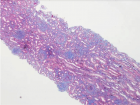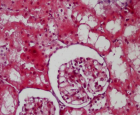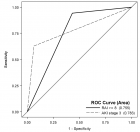Abstract
Review Article
An Appraisal of Recurrent Miscarriage in Sub-Saharan Africa: Occurrence and Possible Solution
Sanmi Emiade*, Bolanle OP Musa, Adekunle O Oguntayo, Abduazeez Hassan and Yemi Balogun
Published: 10 October, 2024 | Volume 7 - Issue 4 | Pages: 103-106
A recurrent miscarriage may be defined in the African context as the foetal demise of two or more successive pregnancies before the attainment of the age of viability. A literature review was done to assess the trend of recurrent miscarriage in sub-Saharan Africa. Identifying the main causes, considering the population at risk, and the availability of accurate diagnostic utilities to effectively ensure good management of recurrent miscarriage is an important gynaecologic issue. Over the years, studies have identified several etiologies and yet there’s been no tangible implementation of therapeutic strategies. Routine modifications should also be employed to develop new approaches to reproductive prognosis. There is notably scanty information on the cases of spontaneous abortion due to chromosomal abnormalities. Genetic and immunological factors should be considered in the work-up plan for women with RM. About 70% of the cases of RM are considered unexplained, and this may be due to limited resources. We concluded that there is relatively poor management of miscarriage and cases of missed and inaccurate diagnosis of the causes of spontaneous abortion in sub-Saharan Africa. More studies are needed in order to assess the extent of genetic induced miscarriage, where resources are limited, folic acid supplements should be provided for pregnant women.
Read Full Article HTML DOI: 10.29328/journal.cjog.1001173 Cite this Article Read Full Article PDF
Keywords:
Miscarriage; Abnormalities; Genetics; Etiology; Gynaecology
References
- Crepaux H, May-Panloup V, Descamps P, Legendre G, Bouet PE. Recurrent pregnancy loss: current perspectives. Int J Womens Health. 2017;9:331-345. Available from: https://doi.org/10.2147/IJWH.S100817.
- American Society for Reproductive Medicine (ASRM). Intravenous immunoglobulin (IVIG) and recurrent spontaneous pregnancy loss. A Practice Committee Report. A Committee Opinion. Birmingham, AL: ASRM; 2002.
- Kolte A, Bernardi L, Christiansen O, Quenby S, Farquharson R, Goddijn M. Terminology for pregnancy loss prior to viability: a consensus statement from the ESHRE early pregnancy special interest group. Hum Reprod. 2014;30(3):495-8. Available from: https://doi.org/10.1093/humrep/deu299.
- Royal College of Obstetricians and Gynaecologists. The investigation and treatment of couples with recurrent first-trimester and second-trimester miscarriage. Guideline No. 17. 2011;1-18.
- Babker AM, Elzaki SG, Dafallah SE. An observational study of causes of recurrent spontaneous abortion among Sudanese women. Int J Sci Res. 2019;4(9):1435-8. Available from: https://www.researchgate.net/profile/Sarah-Sdafallah/publication/338741115_Observational_Study_of_Causes_of_Recurrent_Spontaneous_Abortion_among_Sudanese_Women/links/5e282bbc299bf15216735995/Observational-Study-of-Causes-of-Recurrent-Spontaneous-Abortion-among-Sudanese-Women.pdf.
- Regan L, Braude PR, Trembath PL. Influence of past reproductive performance on risk of spontaneous abortion. BMJ. 1989;299:541-5. Available from: https://doi.org/10.1136/bmj.299.6698.541.
- Cramer DW, Wise LA. The epidemiology of recurrent pregnancy loss. Semin Reprod Med. 2000;18:331-9. Available from: https://www.thieme-connect.com/products/ejournals/abstract/10.1055/s-2000-13722.
- Hady El Hackem, Crepaux V, May-Panloup P, Descamps P, Legendre G, Bouet P. Recurrent pregnancy loss: current perspective. Int J Womens Health. 2017;9:331-45. Available from: https://doi.org/10.2147/IJWH.S100817.
- Umar NJ, Olubiyi SK, Umar A, Umar AG, Abubakar IA, Ayoade IM, et al. Spontaneous abortion among women admitted into gynaecology wards of three selected hospitals in Maiduguri, Nigeria. Int J Nurs Midwifery. 2013. Available from: https://doi.org/10.5897/IJNM2013.0105.
- Ibrahim HG, Muhammad SB, Hafsat AR, Umar UA. Bicornuate uterus presenting with recurrent pregnancy loss: the role of hysterosalpingography in the diagnosis: a report of two cases. Int J Health Sci Res. 2020;10(12):270-273. Available from: https://www.ijhsr.org/IJHSR_Vol.10_Issue.12_Dec2020/38.pdf.
- Aliyu LD, Abdullahi MK. Bicornuate uterus mimicking ectopic pregnancy - a case report. J West Afr Coll Surg. 2012;84-90. Available from: https://www.ncbi.nlm.nih.gov/pmc/articles/PMC4170284/.
- Adeniran AS, Aboyeji AP, Okpara EU, Fawole AA, Adesina KT. Pregnancy outcome in cervical incompetence: comparison of outcome before and after intervention. Trop J Obstet Gynaecol. 2014;31(1):23-9. Available from: https://www.ajol.info/index.php/tjog/article/view/117285.
- Ajayi OO, Charles-Davies MA, Arinola OG. Progesterone, selected heavy metals and micronutrients in pregnant Nigerian women with a history of recurrent spontaneous abortion. Afr Health Sci. 2012;12(2):153-9. Available from: https://doi.org/10.4314/ahs.v12i2.12.
- Van Niekerk EC, Siebert I, Kruger TF. An evidence-based approach to recurrent pregnancy loss. S Afr J Obstet Gynaecol. 2013;19(3):61-5. Available from: https://scholar.sun.ac.za/items/dbc20e2e-451f-4283-9c8e-f55b5462ca8e.
- Shatry NA, Ali R, Wanjohi R, Sekhar G, Odawa FX, Kosgei RJ, et al. Bicornuate unicollis uterine Müllerian anomaly with unilateral haematometra in a ten-year-old: a case report. East Afr Med J. 2015:470-2. Available from: https://www.ajol.info/index.php/eamj/article/view/126679.
- Turesheva A, Aimagambetova G, Ukybassova T, Marat A, Kanabekova P, Kaldygulova L. Recurrent pregnancy loss etiology, risk factors, diagnosis, and management: fresh look into a full box. J Clin Med. 2023;12:4074. Available from: https://doi.org/10.3390/jcm12124074.
- Ndjapa-Ndamkou L, Govender L, Chauke L. Role of genetic factors in recurrent miscarriages: a review. Afr J Reprod Health. 2022;26(10):72-82. Available from: https://doi.org/10.29063/ajrh2022/v26i10.9.
- Eleje GU, Ugwu EO, Philip IE, Malachy DE, Uchenna NE, Ugboaja JO, et al. Prevalence and associated factors of recurrent pregnancy loss in Nigeria according to different national and international criteria (ASRM/ESHRE vs. WHO/RCOG). Front Reprod Health. 2023;5:1049711. Available from: https://doi.org/10.3389/frph.2023.1049711.
- Rolfo A, Nuzzo A, De Amicis R, Moretti L, Bertoli S, Leone A, et al. Fetal–maternal exposure to endocrine disruptors: correlation with diet intake and pregnancy outcomes. Nutrients. 2020;12:1744. Available from: https://doi.org/10.3390/nu12061744.
- American College of Obstetricians and Gynecologists. ACOG Practice Bulletin. Management of recurrent pregnancy loss. No. 24, February 2001. Int J Gynaecol Obstet. 2002;78(2):179-90. Available from: https://doi.org/10.1016/S0020-7292(02)00197-2.
- Alfaqeeh M, Alfian SD, Abdulah R. Factors associated with diabetes mellitus among adults: findings from the Indonesian Family Life Survey-5. Endocr Metab Sci. 2024;2666-3961:1001612. Available from: https://doi.org/10.1016/j.endmts.2024.100161.
- Unfer V, Kandaraki E, Pkhaladze L, Roseff L, Vazquez-Levin MH, Lagan AS. When one size does not fit all: reconsidering PCOS etiology, diagnosis, clinical subgroups, and subgroup-specific treatments. Endocr Metab Sci. 2024;2666-3961. Available from: https://doi.org/10.1016/j.endmts.2024.100159.
- Dukuze N, Tuyishimire B, Irere H, Iradukunda B, Ndinkabandi J, Nsanzabaganwa C, et al. Recurrent spontaneous abortion related to balanced translocation of chromosomes: a case report. Rwanda Med J. 2023;80(1):9-13. Available from: https://pdfs.semanticscholar.org/36e2/7789cb13c81f32db08655f3a4c9958d80b14.pdf.
Figures:
Similar Articles
-
Screening of Gestational diabetes mellitusGehan Farid*,Sarah Rabie Ali*,Reem Mohammed Kamal. Screening of Gestational diabetes mellitus . . 2018 doi: 10.29328/journal.cjog.1001003; 1: 014-023
-
Maternal and fetal outcome of comparative study between old & adopted new value of screening of Gestational Diabetes Mellitus in tertiary centre in Saudi ArabiaGehan Farid*,Reem Mohammed Kamal*,Mohamed AH Swaraldahab,Sarah Rabie Ali. Maternal and fetal outcome of comparative study between old & adopted new value of screening of Gestational Diabetes Mellitus in tertiary centre in Saudi Arabia. . 2018 doi: 10.29328/journal.cjog.1001005; 1: 026-034
-
Immediate postplacental insertion of intrauterine contraceptive device (copper 375) and its complications in term of expulsion, infection and perforationBenish Khanzada*,Mala Jitendra Shahani,Areesha Kamran Khanzada. Immediate postplacental insertion of intrauterine contraceptive device (copper 375) and its complications in term of expulsion, infection and perforation . . 2018 doi: 10.29328/journal.cjog.1001014; 1: 082-086
-
Managing epileptic women in pregnancySarmad Muhammad Soomar*,Saima Rajpali. Managing epileptic women in pregnancy. . 2019 doi: 10.29328/journal.cjog.1001015; 2: 001-002
-
Mesenteric cysts: A rare caseMaryam Asgharnia*,Tayebeh Rahbar,Seyedeh Fatemeh Dalil Heirati. Mesenteric cysts: A rare case. . 2019 doi: 10.29328/journal.cjog.1001024; 2: 067-070
-
Anal cytology in immunocompetent patients with high-grade intraepithelial neoplasia (CIN II and CIN III)Marcio Erik Franco Ribeiro*,Lyliana Coutinho Resende Barbosa,Taylor Brandão Schnaider. Anal cytology in immunocompetent patients with high-grade intraepithelial neoplasia (CIN II and CIN III). . 2020 doi: 10.29328/journal.cjog.1001041; 3: 007-012
-
The influence of HBV or HCV infections on the pregnancy courseTadeusz Wojciech Lapiński*. The influence of HBV or HCV infections on the pregnancy course. . 2020 doi: 10.29328/journal.cjog.1001058; 3: 098-102
-
Pregnancy complicated with deficiency of antithrombin: Review of current literatureMiroslava Gojnic,Zoran Vilendecic,Stefan Dugalic,Igor Pantic,Jovana Todorovic,Milan Perovic,Mirjana Kovac,Irena Djunic,Predrag Miljic,Jelena Dotlic*. Pregnancy complicated with deficiency of antithrombin: Review of current literature. . 2020 doi: 10.29328/journal.cjog.1001059; 3: 103-108
-
Endometrial thickness and frozen thaw embryo transfer: A prospective studyMahalakshmi S,Sakthi A,Saravanan L,Sharma Nidhi*. Endometrial thickness and frozen thaw embryo transfer: A prospective study. . 2020 doi: 10.29328/journal.cjog.1001066; 3: 132-135
-
Overview on current approach on recurrent miscarriage and threatened miscarriageBasant Sharma*,Jagat Deep,Chandrika Pandit,Bina Basnyat,Bandana Khanal,BB Raut,Brij Mohan Rajak,Deepak Patel,Rangina Laikangbam,Rajendra Basyal. Overview on current approach on recurrent miscarriage and threatened miscarriage. . 2020 doi: 10.29328/journal.cjog.1001070; 3: 151-157
Recently Viewed
-
The efficacy of complex Decongestive Physiotherapy in patients with Bilateral Primary Lower Extremity Lymphedema and Untreatable multiple health conditions: A Case ReportHümeyra Kiloatar PT*. The efficacy of complex Decongestive Physiotherapy in patients with Bilateral Primary Lower Extremity Lymphedema and Untreatable multiple health conditions: A Case Report. J Nov Physiother Rehabil. 2017: doi: 10.29328/journal.jnpr.1001011; 1: 093-098
-
Cystoid Macular Oedema Secondary to Bimatoprost in a Patient with Primary Open Angle GlaucomaKonstantinos Kyratzoglou*,Katie Morton. Cystoid Macular Oedema Secondary to Bimatoprost in a Patient with Primary Open Angle Glaucoma. Int J Clin Exp Ophthalmol. 2025: doi: 10.29328/journal.ijceo.1001059; 9: 001-003
-
Metastatic Brain Melanoma: A Rare Case with Review of LiteratureNeha Singh,Gaurav Raj,Akshay Kumar,Deepak Kumar Singh,Shivansh Dixit,Kaustubh Gupta*. Metastatic Brain Melanoma: A Rare Case with Review of Literature. J Radiol Oncol. 2025: doi: ; 9: 050-053
-
Depression as a civilization-deformed adaptation and defence mechanismBohdan Wasilewski*,Olha Yourtsenyuk,Eugene Egan. Depression as a civilization-deformed adaptation and defence mechanism. Insights Depress Anxiety. 2020: doi: 10.29328/journal.ida.1001013; 4: 008-011
-
Drinking-water Quality Assessment in Selective Schools from the Mount LebanonWalaa Diab, Mona Farhat, Marwa Rammal, Chaden Moussa Haidar*, Ali Yaacoub, Alaa Hamzeh. Drinking-water Quality Assessment in Selective Schools from the Mount Lebanon. Ann Civil Environ Eng. 2024: doi: 10.29328/journal.acee.1001061; 8: 018-024
Most Viewed
-
Evaluation of Biostimulants Based on Recovered Protein Hydrolysates from Animal By-products as Plant Growth EnhancersH Pérez-Aguilar*, M Lacruz-Asaro, F Arán-Ais. Evaluation of Biostimulants Based on Recovered Protein Hydrolysates from Animal By-products as Plant Growth Enhancers. J Plant Sci Phytopathol. 2023 doi: 10.29328/journal.jpsp.1001104; 7: 042-047
-
Sinonasal Myxoma Extending into the Orbit in a 4-Year Old: A Case PresentationJulian A Purrinos*, Ramzi Younis. Sinonasal Myxoma Extending into the Orbit in a 4-Year Old: A Case Presentation. Arch Case Rep. 2024 doi: 10.29328/journal.acr.1001099; 8: 075-077
-
Feasibility study of magnetic sensing for detecting single-neuron action potentialsDenis Tonini,Kai Wu,Renata Saha,Jian-Ping Wang*. Feasibility study of magnetic sensing for detecting single-neuron action potentials. Ann Biomed Sci Eng. 2022 doi: 10.29328/journal.abse.1001018; 6: 019-029
-
Pediatric Dysgerminoma: Unveiling a Rare Ovarian TumorFaten Limaiem*, Khalil Saffar, Ahmed Halouani. Pediatric Dysgerminoma: Unveiling a Rare Ovarian Tumor. Arch Case Rep. 2024 doi: 10.29328/journal.acr.1001087; 8: 010-013
-
Physical activity can change the physiological and psychological circumstances during COVID-19 pandemic: A narrative reviewKhashayar Maroufi*. Physical activity can change the physiological and psychological circumstances during COVID-19 pandemic: A narrative review. J Sports Med Ther. 2021 doi: 10.29328/journal.jsmt.1001051; 6: 001-007

HSPI: We're glad you're here. Please click "create a new Query" if you are a new visitor to our website and need further information from us.
If you are already a member of our network and need to keep track of any developments regarding a question you have already submitted, click "take me to my Query."


















































































































































